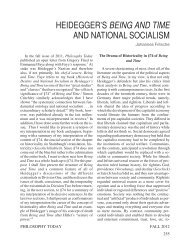SPINOZA'S VIRTUOUS PASSIONS
SPINOZA'S VIRTUOUS PASSIONS
SPINOZA'S VIRTUOUS PASSIONS
Create successful ePaper yourself
Turn your PDF publications into a flip-book with our unique Google optimized e-Paper software.
764 MATTHEW J. KISNER<br />
external ideas, just as our bodies are acted on by external bodies. 12<br />
According to the above, for some body (b), its idea (ib) is adequate if<br />
it fully represents the body’s causes, external objects (e). Thus our ib<br />
is inadequate, among other reasons, because the human mind lacks a<br />
full, true idea of the external objects (ie). Furthermore, according to<br />
Spinoza’s parallelism, ie causes ib, just as e causes b. Since ie is not<br />
contained by the human mind and our ib is, this is an instance of<br />
something external acting on our mind. We can put the point slightly<br />
differently, by focusing on the explanatory sense of ‘cause’: We cannot<br />
conceive of ib entirely through our own mind, since a full account<br />
of ib would have to appeal to its cause ie, which is external to our<br />
mind; in other words, ib is “caused” by something external in the<br />
sense that its explanation requires appeal to something external. 13<br />
Thus describing an idea as inadequate literally means, as the name<br />
suggests, being an inadequate cause of an idea. Consequently, the adequacy<br />
of an idea is a measure of both its epistemic adequacy and our<br />
causal activity in having the idea. 14<br />
With the relevant Spinozistic machinery in place, we can now<br />
show how Spinoza explains passive affects: Suppose that while<br />
12<br />
The claim defended in this paragraph is that all inadequate ideas are<br />
caused by external things, not that all ideas caused by external things are inadequate.<br />
As we will see, we can develop adequate ideas from external<br />
things in the case of common notions (see 2p39).<br />
13<br />
This discussion might give the false impression that we can never<br />
have adequate ideas. After all, if adequate ideas represent causal antecedents<br />
and we can never have all the ideas of the causal antecedents of a thing,<br />
it would seem that we can never have truly adequate knowledge. However,<br />
Spinoza allows two cases where we can attain adequate knowledge: First,<br />
we can attain adequate knowledge of properties which are common to all<br />
things in such a way that the properties are as much in the part as in the<br />
whole; the obvious candidates here are thought and extension (2p38). The<br />
reasoning seems to be that everything we need to know about such properties<br />
is contained in each mode which exhibits those properties such that<br />
knowing the causal history of the mode does not further contribute to our<br />
knowledge. Second, we can have adequate knowledge of the eternal and infinite<br />
essence of God (2p47). The reasoning here is that such knowledge of<br />
God is contained within each mode as the condition for its existence (2p45).<br />
Consequently, it seems that we can attain adequate knowledge of only general<br />
things, universal properties, the infinite nature of substance and its connection<br />
to modes. We will always have inadequate knowledge of empirical,<br />
particular things.<br />
14<br />
Hence forth I will assume that the adequacy of an idea refers both to<br />
its epistemic adequacy and its causal adequacy.
















